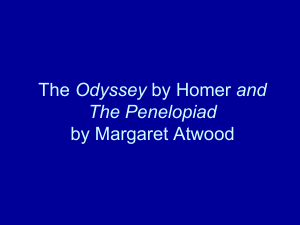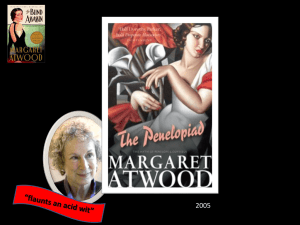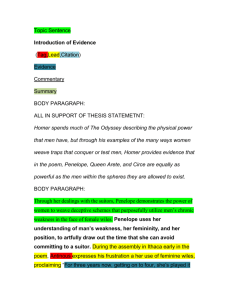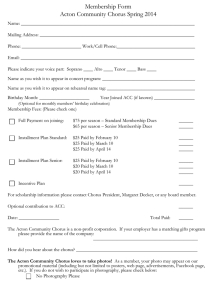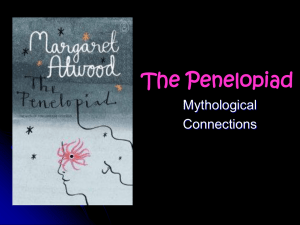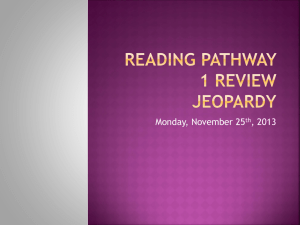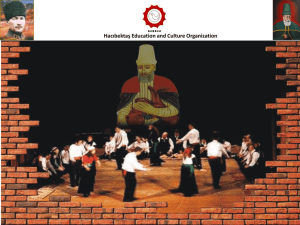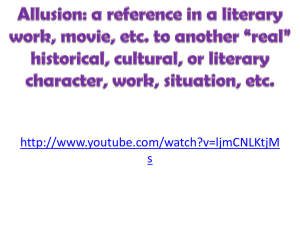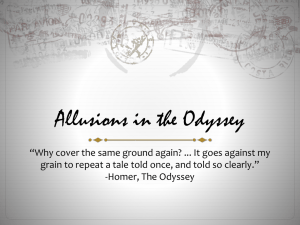penelopiad
advertisement
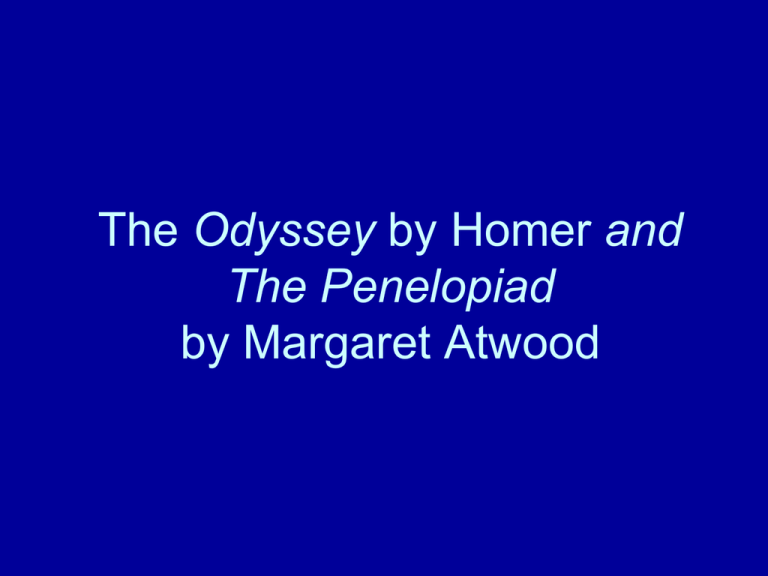
The Odyssey by Homer and The Penelopiad by Margaret Atwood Time period and the Odyssey • Minoans- about 3000-1500 BC – Gave Mycenaeans knowledge of crafts and of writing • Bronze Age/Mycenaean period- about 2000-1200 BC – This is when Greek-speaking people first arrived. – Organized palaces – Engaged in international trade (islands of the Aegean Sea) – Reached its height around 1600 BC – Ended around 1200 BC (*Troy and the Trojan War) • The Dark Age- about 1100-850 BC – Dorians • Archaic period- about 850-480 BC (*Homer) • High Classical period- 482-323 BC Time period and The Penelopiad • If we’re to assume The Penelopiad takes us back to the early years of Penelope’s life (when she was fifteen), then the stories that she’s telling us are from around 1200 BC. • She is speaking from a contemporary time (twentyfirst century)--or at least a time in the twentieth century. She references the “light bulb” (invented in 1879 AD), “the matter-into-energy theories of the twentieth century,” and “the new ethereal-wave system that now encircles the globe” (Atwood 19). Formal Traits of The Penelopiad • Retrospective point of view- occurs when a character looks back at events that occurred in his/her life a long time ago and brings new knowledge or meaning to these events…. – Penelope is speaking from a point about 3000 years after the main events occurred, and she has very different point of view: “Now that I’m dead I know everything. This is what I wished would happen” (Atwood 1). • Greek chorus- a trait in Greek dramas that emerged in the 4th century BC; a (representative) group that delivers background/backstory, summary, commentary on events with a Greek drama/play; usually 12-15 persons – The chorus, consisting of twelve maids (the ones hanged at the end of the Odyssey) in The Penelopiad serve all of the abovementioned functions. Also, it’s worth noting that the chorus often has a separate view from Penelope. They are quite bitter, angry, and bawdy. Formal Traits of The Penelopiad, cont. • Genre play and storytelling modes*- Genre play involves a different approach to a literary genre, such as the epic. Also, genre play may involve mixing of genres. – This book is a re-telling of the Odyssey, an epic. – The book is a combination of prose and poetry. – The chorus…. (See the next slide.) • Fragmentation*- Fragmentation of a narrative involves breaking up the narrative into small segments, by use of white space, section headings, or section assignments. – The Penelopiad has 29 sections, each very short as opposed to the more substantial 24 “books” of the Odyssey. – Furthermore, the chorus sections “interrupt” the narrative, leading to more fragmentation. • Meta-commentary*- Meta-commentary is writing about writing, commentary about writing or storytelling – Penelope speaks (to readers) about her storyteling project: “The difficulty is that I have no mouth through which I can speak” (Atwood 4). – Additionally, the maids comment upon her story as well as their own….Indeed, they mock the story. *These are postmodern traits. The Chorus is Postmodern • There is no chorus in the original Odyssey. (A chorus was more traditionally found in works written by Sophocles, Euripedes, and Aeschylus.) • The chorus is often in poetic/verse form as opposed to the prose of the rest of the book • The chorus provides direct commentary (often negative) on events and their society-as well as direct commentary on Odysseus and Penelope. • The chorus sometimes acts out scenes. We find a story within a story, a play within a play. Feminism • Feminist criticism is defined as “A development and movement in critical theory and in the evaluation of literature which was well under way by the late 1960s and which has burgeoned steadily since. It is an attempt to describe and interpret (and reinterpret) women’s experience as depicted in various kinds of literature. . . .” (Dictionary 315). • Margaret Atwood is a feminist. • In her fiction, feminism is starkly found in The Handmaid’s Tale (a post-apocalyptic dystopian novel) and in The Penelopiad. Feminist Theorists “There are different kinds of myths. This one, the myth of woman. . .is a static myth. It projects onto the realm of Platonic ideas a reality that is directly experienced. . . .Thus, as against the dispersed, contingent, and multiple existences of actual women, mythical thought opposes [with] the Eternal Feminine, unique and changeless. . . .If the definition provided for this concept is contradicted by the behavior of flesh-and-blood women, it is the latter [flesh-andblood women] who are wrong. . . .To pose Woman is to pose the absolute Other, without reciprocity, denying against all experience that she is a subject, a fellow human being” (De Beauvoir 1407). Feminist Theorists, cont. “Woman must write her self: must write about women and bring women to writing. . . .And why don’t you write? Write! Writing is for you, you are for you; your body is yours, take it. I know why you haven’t written. . . .Because writing is at once too high, too great for you, it’s reserved for the great--that is for ‘great men’. . . .A woman without a body, dumb, blind, can’t possibly be a good fighter. She is reduced to being the servant of the militant male, his shadow. We must kill the false woman who is preventing the live one from breathing” (Cixous 2040). Women in The Penelopiad • • • • • • • • Penelope Periboea- Penelope’s mother Iphthime- Penelope’s older sister Helen- Penelope’s cousin Eurycleia- Penelope’s maid; Odysseus’ wet nurse Anticleia- Odysseus’ mother Twelve maids- Penelope’s maids Melantho- one of the twelve maids Voice as Power • Penelope is given voice to – Tell her side of the story (explain her story, defend herself, critique other characters, confess) – To criticize/ “talk back to” Helen • Penelope’s mother is given voice to say what she wants. (Advice to Penelope on p. 43) • Helen gets to speak back against those who criticize her, including Penelope. • The twelve maids tell their side of the story (explain the failings of their societal position as well as the failings of Odysseus and Penelope). The Chorus Line and Feminism • Similar to a Greek chorus, though a Greek chorus would have consisted of men. (*Women were not actors until about the eighteenth century.) • The twelve maids often act or pretend to be other characters. This – Involves a play within a play – Involves these women playing both male and female roles (gender shifting) • They are called a “chorus line,” and this speaks to a group of women performing a synchronized dance with music and/or song. (*Think Broadway…the Rockettes.) Works Cited Atwood, Margaret. The Penelopiad. New York: Canongate, 2005 Print. Dictionary of Literary Terms & Literary Theory. Ed. by J.A. Chuddon. New York: Penguin, 1998. Print. The Norton Anthology of Theory and Criticism. Ed. by Vincent Leitch. New York: Norton, 2001. Print.
